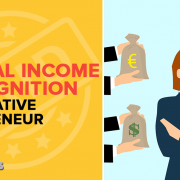How to Get Real Income and Recognition as A Creative Entrepreneur
In the last decade, entrepreneurship has exploded. Especially the online entrepreneurial scene. If you get connected to it on Facebook as much as I am, then all you’ll see are ads for courses, events, and plenty of “friends” offering free value for people to like them and eventually buy from them.
There’s such an ocean of online creative entrepreneurs these days, that it’s easy to be overlooked when you’re beginning. Especially if you do B2B work (which I’m not necessarily a fan of the terms B2B or B2C terminology).
So, instead of going the route that we’ve all been trained to believe is the only way, I have a idea for you I was reminded of from a book I’m reading called the Win Without Pitching Manifesto.
In the book, author Blair Enns shares with us the mindset that we need to use to be seen as an expert in our art and work. He does this through Twelve Proclamations which, when I read them, I was like “Yes, yes, YES! Finally someone is telling it like it should be!”
Practitioners Don’t Present, Stars Don’t Audition
See, here’s the thing. The whole idea of sharing content and essentially your work for free is a relatively new idea. Before the internet, what was heard or seen in popular culture was generated by networks, large labels, and celebrities. Nothing was “free”. Not even the music you heard on the radio or TV. It was (and continues to be) paid for the same way that Facebook is paid today – ads!
As hard as it is to imagine today, not all millionaires and billionaires made their fortunes through the internet. Sure, the internet changes things a bit, but like anything else, it should be seen as a tool.
Believe it or not, there are “online entrepreneurs” today who never built an audience until they were already millionaires. In the most recent session of the AoL Podcast with Tony Whatley, we find that he became a millionaire while he was still working a day job as a mechanical engineer! It’s only now that he’s building his audience.
Same thing with Damion Lupo of session 125. He made his millions in the real estate way before building an online following.
Popularity doesn’t necessarily transfer to profit. Is it a way? Sure. Is it the only way? No.
Personally, I’d rather be a practitioner and NOT a performer.
Embrace Your Inner Expertise
As Blair said in his book, no matter what you make, have experience in, or help others do, it’s much easier to work with them when you’re not constantly pitching your services.
Here’s the general idea of how online marketing usually goes down:
We have been trained to think that we must give work for free so we can show our value. Once we show our value, then we have the potential to market. Then, as we market regularly, we might see some sales if we have a product that’s desired by our audience.
The problem with that is that when we pitch our work and services to potential clients and customers, we’re giving them the power to control if they want to buy from us.
However, if we were to approach sales like a lawyer, doctor, or a mechanic then you don’t give up that control.
Doctors, lawyers, and mechanics never do free work. Any time we go to them, we expect to pay (unless of course it’s a pro bono case) for their efforts.
Why should we as creative entrepreneurs think any differently?
Examine, Solution, Implementation
So how do doctors, lawyers, and mechanics work that’s different than other entrepreneurs?
For one, they respect their work. They know that the person who’s talking to them can’t do what they can. Therefore, if they don’t work with them, their problem won’t be solved.
This is called positioning.
Next, through examination, they determine if they’re a fit for what the potential client needs. They do this by offering a vague solution so the client has an idea of what the situation calls for, but they don’t give all the step by step instructions in how to do it.
Next, once the potential client believes that the solution that has been given to them is what is needed, they agree to pay once the expert’s work is implemented.
In our situation, we might not feel comfortable with that arrangement, so we might only implement after payment. Or, you could go halvsies and pay 50% before the work and the rest after the job is done.
Action Steps
Anyhow, guys. This is some advice that I hope you think about. If you’re an artist and want to be rewarded for your work, then this approach will get you more commissions.
Of course, you’ll need to go to more trade shows, go to more conferences, and/or pay for more ads on social media, but it’s much more efficient then hoping you’ll get results.
Oh, and don’t forget to check out that book! It’s a game changer!


